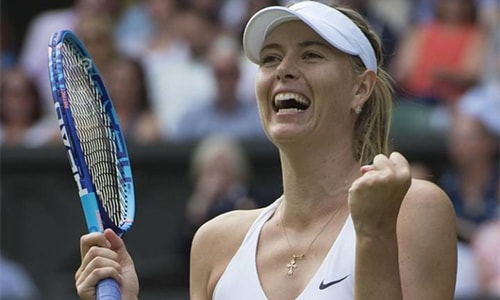Sharapova's sentence reduced, returning to competition from April 2017
The Court of Arbitration for Sport (CAS) on October 4 ruled on the appeal of the "Russian Doll" after she used a banned substance earlier this year.
Maria Sharapova tested positive for meldonium at the Australian Open earlier this year. The 29-year-old was initially handed a two-year ban by the International Tennis Federation (ITF).
However, according to the latest ruling by CAS, which is handling Sharapova's appeal, her sentence was reduced to one and a half years."Russian Doll",Therefore, allowed to return to competition from April 26, 2017.
"I was counting the days until I could come back," Sharapova said after learning of the CAS ruling. "The ban, whatever it was, felt like something I loved was taken away from me. So it's nice to get it back. Tennis is my passion. I miss playing the game so much."
 |
Masha has recently appeared at many events and been the center of attention, but she is always unhappy about having to leave her passion for tennis. Photo: AFP. |
Meldonium, a drug also known as mildronate, found in cardiovascular drugs, has been added to the World Anti-Doping Agency (WADA) list of banned substances in sports since January 1, 2016.
Sharapova admitted to using the substance since 2006 for health reasons, but stressed that she "did not intentionally use a performance-enhancing drug". The Russian tennis player insisted that she and her support team had no idea that mildronate had been banned by WADA.
With those arguments, Sharapova, in her appeal to CAS, said that she could not accept the "grave injustice" such as the two-year ban from competition from the ITF.
After consideration, the councilCAS concludes Sharapova's case is "not one of deliberate cheating", but also added that the Russian tennis player "bears heavy responsibility for her violations".Sharapova's fault, according to CAS, was "failing to provide adequate instructions" to her assistants during the WADA banned substance list testing process, and "failing to advise and control" her assistants.
Sharapova won her first Grand Slam title in 2004, when she won Wimbledon at the age of 17. She then won the Australian Open, Roland Garros and US Open to complete her collection of four Grand Slam titles.
Sharapova's suspension was imposed on January 26, 2016. Thanks to that, she was able to return to competition in time to compete at Roland Garros in May 2017.
 |
Sharapova may be able to return to compete at Roland Garros - the second Grand Slam tournament of the year - 2017. |
"In March, I had one of the worst days of my life when I learned about the ban. Today is one of the happiest days of my life, when I learned that I can return to play from next April," Sharapova could not hide her joy after CAS reduced her sentence.
"I have learned a lot from this, and I hope the ITF has too. CAS concluded that 'they disagreed with many of the details of the ITF's conclusions' against me. I took responsibility from the beginning, because I did not know that my substance had been used for 10 years before it was banned. But I also think that other federations have done a better job of informing their athletes about the rule change, especially in Eastern Europe, where millions of people use mildronate," she added, taking a swipe at the ITF.
"Anyway, it's over now. I just hope that the ITF and relevant anti-doping departments in tennis will study and learn from the procedures of many other sports federations, so that no other tennis player will have to suffer like what I just went through," Sharapova emphasized.
According to VNE
